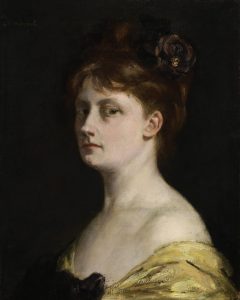 Maureen Gibbon’s Paris Red is a story about a young, poor girl who becomes involved with the much older, well-off painter Edouard Manet. At first, he courts both the narrator, Louise, and her best friend Denise simultaneously, taking pleasure in the idea of having them both, but this (predictably) fails, leading to a falling out between Louise and Denise. Throughout the three-way relationship, Louise is always the one to take the initiative with Manet, even to the point of excluding Denise, and this is what leads to the inevitable downfall of the threesome and the formation of Louise and Manet’s more exclusive pairing.
Maureen Gibbon’s Paris Red is a story about a young, poor girl who becomes involved with the much older, well-off painter Edouard Manet. At first, he courts both the narrator, Louise, and her best friend Denise simultaneously, taking pleasure in the idea of having them both, but this (predictably) fails, leading to a falling out between Louise and Denise. Throughout the three-way relationship, Louise is always the one to take the initiative with Manet, even to the point of excluding Denise, and this is what leads to the inevitable downfall of the threesome and the formation of Louise and Manet’s more exclusive pairing.
From the beginning of the story it is clear that Louise, or Victorine, as she calls herself, is a hedonistic and self-interested character. She knows her desires and does not hesitate to pursue them, regardless of the consequences to those around her or even to herself. She has a keen understanding of the relationship dynamics between herself, Nise, and Manet, and chooses to behave in ways that she knows will be hurtful to Nise simply because she wants to, and because getting what she wants is more important to her. She seems to be aware, in theory, of the financial irresponsibility of leaving her stable (if stagnant) job to become a model de profession, entirely financially dependent on her new, much older boyfriend, but she does it anyway. She values potential reward over any amount of risk, and never thinks about the long-term. All of this is attributed to her age, which is repeatedly emphasized: seventeen. She is a teenager, and underage by today’s standards (while Manet is, notably, thirty years old). She is not an emotionally mature person, and her every action reflects this.
Victorine is very consistently characterized in the way I have described, but I could also be more generous in my framing of her personality. She could be considered ambitious, self-aware, and free-spirited. She is certainly socially cognizant, making highly accurate assessments of Nise’s and Manet’s mental states and motivations, as well as her own (which, to me, makes her actions all the more frustrating — that she knows why she does what she does as well as the effect that it will have and still chooses to do it is less forgivable than stupidity). She is also, again, seventeen years old, and her actions can only be judged as those of a seventeen year old. Presumably, some of the more admirable sides of her personal qualities will shine through with age — however, the novel ends as soon as she begins to move in that direction.
The end of the novel is a beginning more than anything. Victorine has initiated a reconciliation with Nise, has begun to explore her new profession by posing for someone other than Manet, and has come to a realization about her own love of art and color — something Manet expresses a desire to nurture. Through her relationship with him, doors have been opened, and by the end of the novel, when she sees the finished product of Olympia, she seems to be on her way to becoming self-realized — an optimistic and satisfactory conclusion.